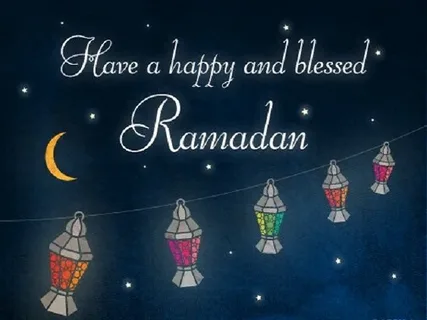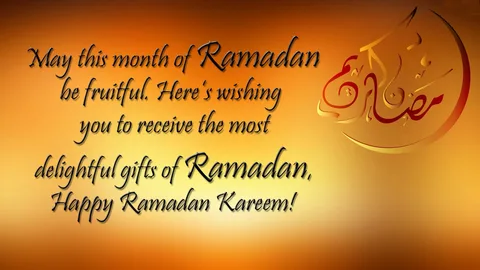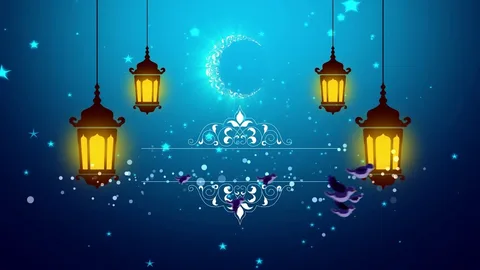Ramadan is a sacred month observed by Muslims worldwide, marked by fasting, prayer, reflection, and community gatherings. It is a time of spiritual renewal, self-discipline, and devotion to Allah. As Ramadan approaches, it’s essential to understand the significance of extending warm wishing happy ramadan to friends, family, and colleagues observing this holy month.
Significance of Ramadan

Ramadan is the ninth month of the Islamic lunar calendar and holds great significance for Muslims around the world. Here are some key aspects of its significance:
- Spiritual Reflection and Self-Discipline: Ramadan is a time for Muslims to engage in increased prayer, Quranic recitation, and spiritual reflection. Fasting from dawn until sunset helps believers cultivate self-discipline, patience, and empathy for those who are less fortunate.
- Connection with God: Muslims believe that Ramadan is a time when the gates of heaven are open, and the gates of hell are closed, signifying a special opportunity for spiritual growth, forgiveness, and mercy from Allah.
- Community and Solidarity: Ramadan fosters a sense of unity and solidarity among Muslims worldwide. The daily breaking of the fast, known as iftar, often involves communal gatherings where families, friends, and neighbors come together to share meals and strengthen bonds.
- Charity and Generosity: Zakat, or obligatory charity, is one of the Five Pillars of Islam, and Ramadan is a time when Muslims are encouraged to increase their acts of charity and generosity towards those in need. Many Muslims also engage in voluntary acts of charity, known as Sadaqah, during this month.
- Revelation of the Quran: Muslims believe that the Quran was revealed to Prophet Muhammad (peace be upon him) during the month of Ramadan. Therefore, this month holds special significance for the recitation and study of the Quran, with many Muslims aiming to complete the entire text during the month.
- Renewal of Faith and Commitment: Ramadan serves as a time for Muslims to renew their faith, strengthen their relationship with Allah, and recommit themselves to living according to Islamic principles and values.
Traditions and Practices during Ramadan
During Ramadan, Muslims observe several essential practices:
Fasting (Sawm)
Muslims fast from dawn until sunset, abstaining from food, drink, smoking, and other physical needs. Fasting is not only a physical act but also a spiritual one, intended to purify the soul and develop empathy for those less fortunate.
Prayer (Salat)
Muslims engage in increased prayer and recitation of the Quran during Ramadan. They perform additional prayers, including the Taraweeh prayers offered at night.
Charity (Zakat)
Charity and giving back to the community are integral parts of Ramadan. Muslims are encouraged to give to those in need, whether through financial contributions, feeding the hungry, or volunteering.
Reflection and Spiritual Growth
Ramadan is a time for self-reflection and spiritual growth. Muslims seek to strengthen their relationship with Allah through increased devotion, prayer, and acts of kindness.
Recite quran in ramadan
Reciting the Quran during Ramadan is highly encouraged and holds special significance for Muslims. The Quran, Islam’s holy book, is believed to have been revealed to Prophet Muhammad (peace be upon him) during this blessed month. Here are a few points about reciting the Quran during Ramadan:
- Increased Emphasis: Muslims strive to increase their recitation of the Quran during Ramadan, aiming to complete the entire text at least once during the month. Many mosques hold special Quranic recitation sessions, known as Taraweeh prayers, during the evenings of Ramadan, where the entire Quran is recited over the course of the month.
- Spiritual Connection: Reciting the Quran during Ramadan allows Muslims to deepen their spiritual connection with Allah and gain a deeper understanding of the teachings and guidance contained within the holy book. It is a time for reflection, contemplation, and seeking guidance from the words of Allah.
- Reward and Blessings: Muslims believe that reciting the Quran during Ramadan carries special rewards and blessings. It is considered a virtuous act that brings spiritual purification, forgiveness of sins, and increased closeness to Allah.
- Community Engagement: Many Muslims participate in Quranic study circles or gatherings during Ramadan, where they come together to recite, study, and reflect upon the meanings of the Quranic verses. This fosters a sense of community and mutual support in the pursuit of spiritual growth.
- Personal Goal Setting: During Ramadan, Muslims often set personal goals for Quranic recitation, aiming to complete a certain number of chapters or verses each day. This helps to maintain consistency and focus in their spiritual practice throughout the month.
How to Wish Happy Ramadan

Wishing someone a Happy Ramadan is more than just a courteous gesture; it acknowledges and respects the significance of this sacred month in their lives. It shows empathy, understanding, and solidarity with their religious observance. When wishing someone a Happy Ramadan, it’s essential to do so respectfully and thoughtfully. Here are some ways to convey your wishes:
- Respectful Greetings: Begin your message with a respectful greeting such as “Ramadan Mubarak” (Blessed Ramadan) or “Ramadan Kareem” (Generous Ramadan).
- Sharing Blessings and Good Wishes: Express your heartfelt blessings for their health, happiness, and spiritual fulfillment during Ramadan.
- Sending Ramadan Cards or Messages: Consider sending a personalized Ramadan card or message to show that you’re thinking of them during this special time.
Cultural Sensitivity in Ramadan Wishes
It’s important to be culturally sensitive when wishing someone a Happy Ramadan. Be mindful of their religious beliefs and customs, and avoid making assumptions or generalizations. Respect their privacy and personal space, and only offer Ramadan wishes if you are sure they observe the holiday.
Examples of Happy Ramadan Wishes
Here are some examples of Happy Ramadan wishes that you can use to convey your sentiments:
- “Wishing you and your family a blessed Ramadan filled with joy, peace, and prosperity.”
- “May Allah’s blessings be with you and your loved ones this Ramadan and always.”
- “Sending you warm wishes for a spiritually fulfilling Ramadan. Ramadan Mubarak!”
- “As you fast and pray during this holy month, may you find peace and happiness in the blessings of Ramadan.”
FAQs
Why is Ramadan considered the holiest month in Islam?
Ramadan is considered the holiest month because it is the month when the Quran, the holy book of Islam, was revealed to the Prophet Muhammad.
Do all Muslims fast during Ramadan?
Fasting during Ramadan is one of the Five Pillars of Islam and is obligatory for all adult Muslims, with exceptions for those who are ill, elderly, pregnant, breastfeeding, menstruating, or traveling.
What is the significance of the pre-dawn meal (Suhoor) during Ramadan?
Suhoor is eaten before dawn and is an important meal during Ramadan as it provides sustenance for fasting throughout the day. It is also seen as a time for spiritual reflection and preparation.
How do Muslims break their fast during Ramadan?
Muslims break their fast with a meal called Iftar, which is done immediately after sunset. Traditionally, dates and water are consumed first, followed by a larger meal.
What is the significance of the Night of Power (Laylat al-Qadr) during Ramadan?
Laylat al-Qadr, also known as the Night of Power, is considered the holiest night of the year in Islam. It is believed to be the night when the Quran was first revealed to the Prophet Muhammad and is associated with divine blessings and forgiveness.
Conclusion
In conclusion, wishing someone a Happy Ramadan is a meaningful way to acknowledge and respect their religious observance during this sacred month. By extending warm wishes and blessings, we can foster understanding, empathy, and unity within our communities.


